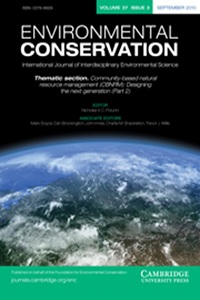Bridging climate science to adaptation action in data sparse Tanzania
Abstract
SUMMARYIn the face of an already changing climate, conservation practitioners and local communities face the major challenge of how to plan for a future climate. In data-sparse areas of the world, where action is often most needed, the daunting scope of the problem can lead to inaction. This paper shows that climate adaptation planning can be accomplished successfully with publicly and globally available data by linking science and stakeholders through a facilitated process. Working with local stakeholders in the western Tanzanian Greater Mahale and Greater Gombe Ecosystems, future climate projections produced using Climate Wizard and analyses of literature provided an understanding of the climate vulnerabilities of local ecosystems and human livelihoods. Facilitated workshops enabled local stakeholders to use this information to develop conceptual models and hypotheses of change for these systems, and to identify possible modifications to conservation plans. Here, climate change planning required the modification of most current conservation strategies, developing some new strategies and abandoning others. The paper indicates that climate adaptation planning is achievable even in data-sparse rural and developing areas, but requires appropriate scientific analyses, engaged stakeholders and a facilitated process

